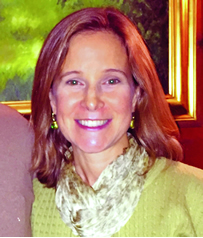Research that suggests strong links between environmental influences and the risk for developing systemic lupus erythematosus (SLE) will be the topic of this year’s Rheumatology Research Foundation Edmond L. Dubois, MD, Memorial Lectureship.

Each year, this lectureship features an outstanding young investigator in the field of basic or clinical SLE research. This year’s honoree, Karen H. Costenbader, MD, MPH, Associate Professor of Medicine at Harvard Medical School and Associate Physician and Director of the Lupus Program at Brigham and Women’s Hospital, Boston, will shed light on how genetic and environmental factors interact in the development of SLE.
The session takes place Tuesday from 2:30 – 4:00 pm in Ballroom A.
“Dr. Costenbader’s abstract focuses on cigarette smoking and the risk of SLE,” said session moderator Meenakshi Jolly, MD, MS, Associate Professor in the Departments of Medicine and Behavioral Sciences and Director of the Rush Lupus Clinic at Rush University Medical Center, Chicago. “Her work indicates that smoking is a strong risk factor for dsDNA seropositive SLE, but not for dsDNA seronegative SLE. Dr. Costenbader will also review the data on other environmental risk factors for SLE — both confirmed and potential — including obesity, no or low alcohol intake, silica, oral contraceptives, and postmenopausal hormones.” Dr. Costenbader said there is a steadily forming picture of how SLE develops in some people, but not others.

“Both genetic and environmental factors, and their interactions, are important,” she said. “Genetics, however, are not modifiable, at least not at the present time. Identifying and understanding the environmental exposures increasing risk of SLE will allow us to identify specific pathogenic mechanisms in SLE development and allow for the development of strategies to attempt to prevent SLE among those at high risk.”
Dr. Jolly said Dr. Costenbader’s findings are important because there is no cure for SLE and few advances in treatment have been made, which makes prevention key.
“The search for factors that increase the risk of developing SLE, especially modifiable ones, are of significant interest because they may help reduce the burden of disease on patients and their families,” Dr. Jolly said. “Dr. Costenbader’s research is focused on epidemiologic risk factors for the development of SLE. She was unanimously selected for the Dubois lectureship based on the strength and quality of the abstract, which was among the top-ranking SLE abstracts submitted this year. Her work may pave the way for further revelations in the pathogenic mechanisms in SLE development, and potentially for developing preventive intervention strategies.”
Dr. Costenbader said that SLE prevention trials with medications are already underway.
“If we understand how SLE develops and is triggered or accelerated by environmental factors, and we can identify those at highest risk, then we could develop strategies to mitigate or avoid the environmental risk factors,” she said. “Such strategies should be tested to see whether risk factor modification could forestall or abrogate disease. SLE has several different and overlapping subtypes defined by serologies and organ system involvement.
The risk factors for different SLE subtypes may also be different, as in the example of smoking and dsDNA+ SLE. Dissecting the relationships between specific environmental exposures and specific subtypes of SLE may help us to identify different molecular pathways in SLE pathogenesis for the different subtypes of disease.”
In 2009, Dr. Costenbader was selected by the Lupus Foundation of America as the recipient of the inaugural Mary Betty Stevens, MD, Memorial Young Investigator Prize, and in 2011 she received the Henry Kunkel Young Investigator Award from the ACR. She is an associate editor of Arthritis & Rheumatology and The International Journal of Clinical Practice.
Dr. Costenbader is an active clinical research mentor for medical students, residents, graduate students in epidemiology, and rheumatology fellows and junior faculty.
She has trained more than 30 doctoral and post-doctoral fellows. She is principal investigator of the BWH Lupus Registry containing data on more than 6,000 patients, and has established the BWH Lupus Biobank, used for studies investigating biomarkers, molecular signatures, and genetics.
CLINICAL SCIENCE TRACK
Rheumatology Research Foundation Edmond L. Dubois, MD, Memorial Lectureship
2:30 – 4:00 pm Tuesday • Ballroom A
